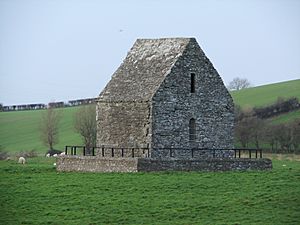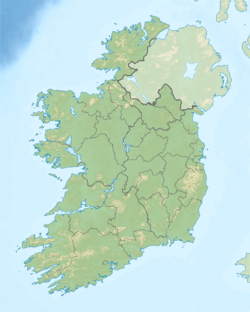St. Mochta's House facts for kids
Quick facts for kids St. Mochta's House |
|
|---|---|
| The Monk's House | |
|
Teach Naomh Mochta
|
|
 |
|
| 53°57′12″N 6°32′43″W / 53.953412°N 6.545339°W | |
| Location | Priorstate, Louth, County Louth |
| Country | Ireland |
| Denomination | Church of Ireland |
| Previous denomination | Pre-Reformation Catholic |
| Architecture | |
| Functional status | inactive |
| Heritage designation | |
| Official name | St. Mochta's House |
| Reference no. | 312 |
| Style | Celtic Christianity |
| Years built | c. 1150–1200 |
| Specifications | |
| Length | 4.88 m (16.0 ft) (internal) |
| Width | 2.82 m (9 ft 3 in) (internal) |
| Number of floors | 2 |
| Floor area | 13.7 m2 (147 sq ft) |
| Materials | stone |
| Administration | |
| Diocese | Armagh |
St. Mochta's House is a very old stone building in County Louth, Ireland. It was once a small church or prayer house, also known as an oratory. Today, it is a special protected site called a National Monument. This means it is an important part of Ireland's history.
Contents
Where is St. Mochta's House?
St. Mochta's House is found in Ireland. It is a short distance northwest of Louth village. Louth village is in County Louth.
The Story of St. Mochta's House
Who Was Saint Mochta?
The building is named after Mochta, a very old saint. He lived a long, long time ago, around the 500s AD. Mochta was a student of Saint Patrick, who is famous for bringing Christianity to Ireland. Around the year 528 AD, Saint Mochta started a monastery in Louth village. A monastery is a place where monks live and pray.
When Was the Building Made?
The stone buildings you see at the site today are not from Saint Mochta's time. The main church nearby, called St. Mary's Priory, was built in the 1200s. St. Mochta's House is thought to be from the late 1100s. Some people think it might be even older, from the 800s to 1000s.
What About Relics?
Many old stone buildings in Ireland are named after saints. People often believed these buildings held the saint's grave or special items called relics. Relics are things like bones or belongings of a saint. In 1242, a big meeting of church leaders happened in Louth. Records say that some relics that Mochta had brought from Rome were shown. This might mean he brought relics of other saints. It could also mean his own bones were added to the collection.
Protecting the Building
In 1906, a wall was built around St. Mochta's House. This was done by the Louth County Council. Later, in 1934, the Office of Public Works did more work to protect the building. They helped make sure it would last for many more years.
What Does St. Mochta's House Look Like?
St. Mochta's House is a rectangular building. It has a special type of roof called a barrel-vaulted roof. This means the roof is curved like the inside of a barrel. Inside, there is a room above the main floor. You can reach this upper room by an internal staircase. The building is made of stone.
 | Leon Lynch |
 | Milton P. Webster |
 | Ferdinand Smith |


